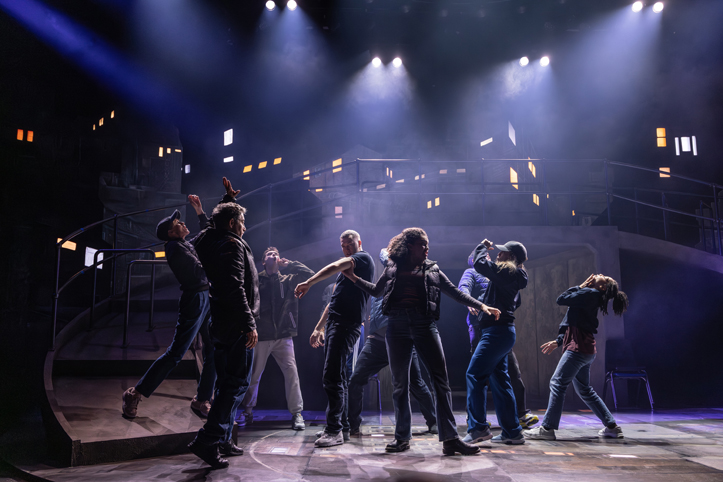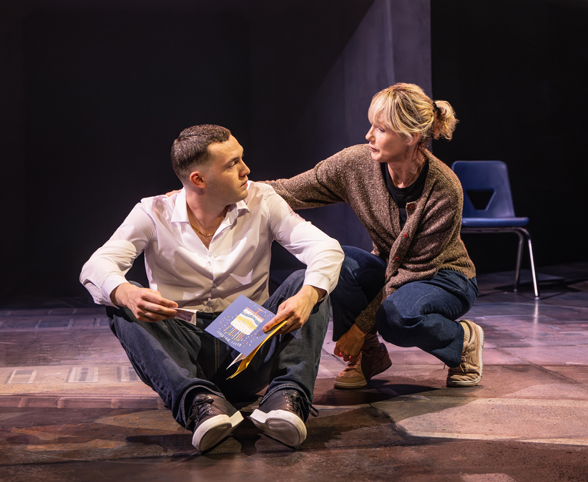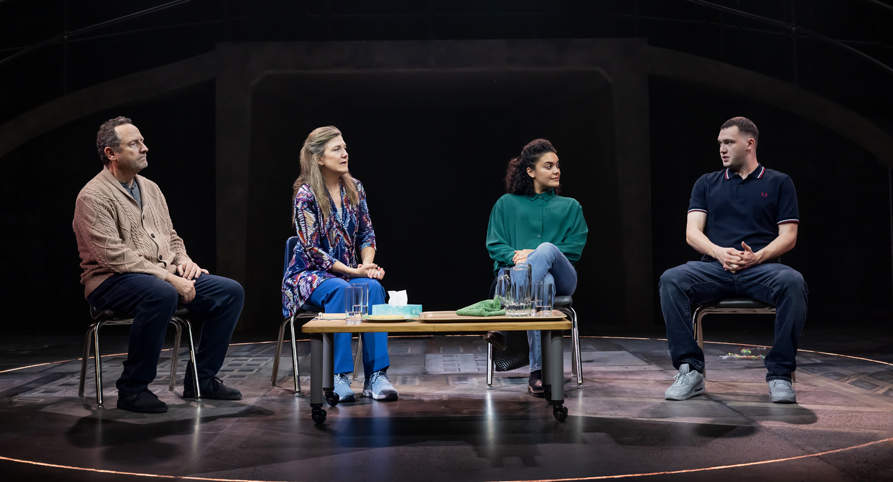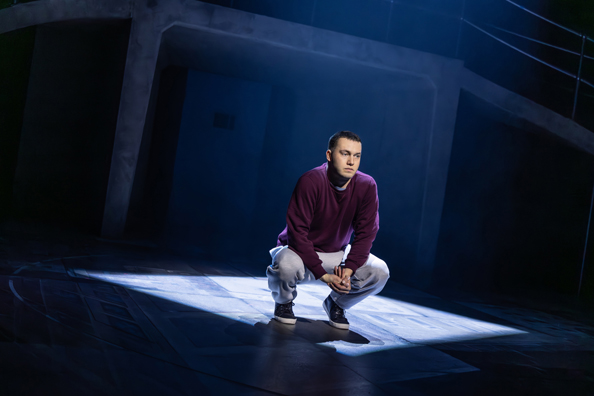By Alix Cohen
Jacob (Will Harrison) is growing up in what Americans would call the projects- a British estate of low income housing. His attentive, single mother (an excellent Lucy Taylor) sees to it he goes to a good school. For no obvious reason, the young man chooses to run with the bad boys. He plays hooky, drinks, takes drugs and goes looking for trouble.
In an extended, unnecessary Act I flashback, we learn that at 19, unprovoked anger results in the death of a stranger. Jacob lands in prison. Unpremeditated, the charge is manslaughter. Fifteen minutes might’ve set up what takes a numbing hour plus. Stylized direction compounds writing that leaves us unmoved.

The Company
Act II, however, is fascinating. Britain’s data protection keeps those affected by a crime from learning particulars. A UK program called Restorative Justice seeks to fill the gap. The voluntary process brings together victims of crime (or their surviving loved ones) and offenders to discuss the impact of the event, explore ways to repair the harm, and discover a path forward. It’s not about punishment—it’s about accountability, dialogue, and healing. A terrific idea.
https://www.restorativesolutions.org.uk/why-we-do-it/case-studies
When Jacob is released, he struggles to make a life for himself in a world where prison records impede. Pervasive guilt aggravates. Probation officer Wendy (Lucy Taylor) and Restorative Justice practitioner,Nicola (Camila Cano-Flavia), offer a unique path to possible, seemingly counterintuitive healing.

Jacob (Will Harrison); his mom (Lucy Taylor)
The victim’s grieving mother Joan, (marvelous Victoria Clark, whose every moment onstage seems real), expresses a desire to know and understand what really happened. She feels sympathy for Jacob’s mom. Her husband David (a credible Sam Robards) is slower to come around.
Contact with the young man begins tenuously with exchanged letters, progressing over time to the three meeting, moderated by Nicola. The scene is realistic and affecting, no rose-colored glasses in evidence. Gradually, empowerment begins to win over helplessness, accountability is assumed, rehabilitation supported. Jacob, in fact, will rise like a phoenix. The second act is worth the play.
A college teacher railing against Capitalism and inclusion of a grandmother don’t fit with other content.
Will Harrison’s Jacob is a kinetic, raging young man unable to comprehend or express his emotions. Imagine early Brando. The actor vibrates with pain and confusion.

David (Sam Robards) & Joan (Victoria Clark)- the victim’s parents; Nicola (Camila Cano-Flavia)- Restorative Justice representative;
Will Harrison (Jacob)
Adam Penford’s Direction creates distinctive characters, but not until the last scene do we feel for those involved.
When featuring the company, Movement Direction (Leanne Pinder) too often creates what appears to be a rave captured on
Tik-Tok
Company British accents, excluding leads, are all over the place. (Charlotte Fleck & Ben Furey)
Anna Fleischle’s forbidding Set works as tenements and prison. Subtle indication of background buildings is effective.
Robbie Butler’s Lighting Design is so prominent, it might be listed as a cast member. Much of it is evocative, but the artist goes overboard swallowing narrative. Use of multicolored gels at one point makes drama look like circus.
Digital Music & Sound Design by Alexandra Faye Braithwaite are superb.
Photos by Matthew Murphy
Punch by James Graham
Based on the book Right from Wrong by Jacob Dunne
Directed by Adam Penford
Manhattan Theatre Club Samuel J. Friedman Theatre
261 West 47th Street
https://www.manhattantheatreclub.com/


